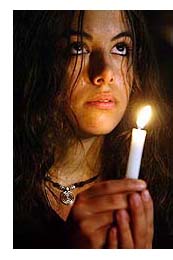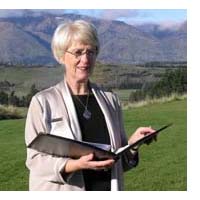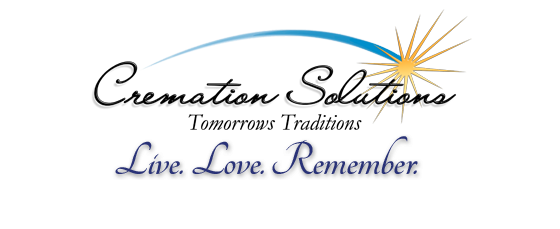Funeral and Memorial Planning Guide
The Human Need for Ritual
When you think about it, human rituals are punctuation marks of life’s journey.
 An exclamation point marks the excitement for a baptism or wedding, commas mark the rites of passages through school graduations and a period marks the finality of a death. Other than marking an important event, human rituals have other deep purposes. Human rituals, such as funeral ceremonies and memorial ceremonies, allow people a therapeutic resource for dealing with life’s traumatic events. Both funeral ceremonies and memorial ceremonies have the important ingredients of meaning, message, group support and complete involvement. Funeral rituals fulfill the human need to cope with the deeper feelings of life in the event of the loss of a loved one. Without a proper funeral or memorial ceremony, survivors are left without a meaningful way to express deep emotional feelings and alone in their grief.
An exclamation point marks the excitement for a baptism or wedding, commas mark the rites of passages through school graduations and a period marks the finality of a death. Other than marking an important event, human rituals have other deep purposes. Human rituals, such as funeral ceremonies and memorial ceremonies, allow people a therapeutic resource for dealing with life’s traumatic events. Both funeral ceremonies and memorial ceremonies have the important ingredients of meaning, message, group support and complete involvement. Funeral rituals fulfill the human need to cope with the deeper feelings of life in the event of the loss of a loved one. Without a proper funeral or memorial ceremony, survivors are left without a meaningful way to express deep emotional feelings and alone in their grief.
Even the ancient Egyptians and Greeks emphasized the importance of a proper burial. Time-honored rituals included oil anointing of the body, adorning the body with a wreath, a viewing of the body and a cemetery procession. The afterward feast was a sign of gratitude to those who took part in the ceremony and burial. After the burial, many of the Greek women would visit the graves with offerings of libations and small cakes. Although funeral traditions have evolved over time, the need for a funeral ritual still prevails in man. Funeral rituals commemorate the departedwhile comforting the survivors.
Planning Funeral Ceremonies and Memorial Ceremonies
With the emotional stress of the death of a loved one, the planning and preparation of a funeral ceremony can be overwhelming. Clergy, funeral directors and funeral celebrants can all assist families and friends in the the planning of funeral ceremonies to ease the process. Today, celebrant funerals are paving the way for a more meaningful ceremony. Celebrant funerals can be religious or for families who aren’t religious in the traditional sense. They are also appropriate for those who are self-described agnostics or atheists. Funeral ceremonies and memorial ceremonies should be personal and intimate. Funeral celebrants are trained professionals who prepare ceremonies that reflect the person’s personality and life. They work closely with families to create a ceremony that is filled with storytelling, readings and favorite music that capture the essence of the departed one.
 A Life with a Story
A Life with a Story
Every life has a story to be told. Preparing a eulogy allows family and friends to paint a picture of the deceased through stories, anecdotes and memories. Who they were, what they did and what they enjoyed about life are the elements that help create the story. Humorous times and touching moments shared can all be incorporated into a eulogy. Special accomplishments, hobbies, education, family members and careers are also considerations that are woven in a eulogy. While some people prefer to present a solemn eulogy, there are also some who prefer a lighter tone. For the most part, a blend of humor and solemnity is usually best. This way, family and friends can grieve appropriately while sharing in the celebration of a life lived. Celebrant funerals typically embrace this combination.
Often, funeral poems are part of the eulogy. Poems are an excellent way of putting your feelings of bereavement in a creative and touching manner. You can prepare your own poem or choose a published funeral poem. You may think that writing your own poem may be too difficult but if you write from the heart, you’ll find that the words will easily flow. A funeral celebrant can also assist you with composing your own heartfelt poem. If you prefer a published funeral poem, here’s an example to give you an idea of how these poems usually flow.
“Goodbye to you, my love.
Your laughter would always echo in my thoughts
As I hear it, it causes me pain and joy
I miss the memories that you and I shared
And it brings tears to my eyes
These are the same memories would help me through the nights
To overcome my sorrow and continue to live
With happy thoughts of her love...
To my dear love, my heart is yours forever
My love will continue to live in your memories.”
Choosing the Music for Funeral Ceremonies and Celebrant Funerals
Music is a language of the soul and heart that expresses emotion when words fail. In times of grief, music can surround us with a warm embrace of comfort. It is always an important part in the planning of meaningful funeral ceremonies, memorial ceremonies and celebrant funerals. Traditionally, funeral music is chosen to commemorate the life of a departed one, convey feelings for a loved one or to express specific after death religious beliefs. Music should be carefully chosen to live on in the memories and hearts of those who attend the services.
There is a wide array of resources for music. Even family members and friends who are musicians can sing or play music at a service. If you prefer a live performance and don’t know a singer or musician, funeral directors and churches can usually make recommendations. In addition, most funeral homes have sound systems for the playing your own CDs or tapes. Often, they will also have a large selection of recorded music like popular, sacred and classical. Here is a list of some popular and classical songs for a funeral service:
- “Amazing Grace”
- “Candle in the Wind”
- “Angel”
- “Hallelujah”
- “Ave Maria”
- “Canon in D Major”
- “The Lark Ascending”
When it comes to choosing funeral music, there are really no fast and hard rules. You can always choose funeral music that the departed one enjoyed. If your loved enjoyed good old-time country western music from artists like Johnny Cash and Willie Nelson, playing their favorite western tunes is an ideal way to honor a loved one. There are also contemporary artists like Carrie Underwood who have some great gospel albums.
Celebrant Funerals
When you hire a funeral celebrant, there are many options. Funeral celebrants can help plan the whole ceremony or work with families to develop a eulogy. Some celebrants perform the whole ceremony while there are some families who prefer to perform the ceremony themselves. If clergy are performing the ceremony, a funeral celebrant can assist with preparing a eulogy. At Cremation Solutions, we provide celebrant writing services online and through phone interviews. We take the time to gather all the important information to prepare a eulogy that will capture the true essence of your loved one and enhance the memorial ceremony. For a custom ceremony, be sure to contact us at www.cremationsolutions.com.
Browse Categories
Browse Products
-
Funeral Writing Service
$400.00 -
Committal Writing Service
$200.00 -
Life Story Tribute DVD
$150.00













